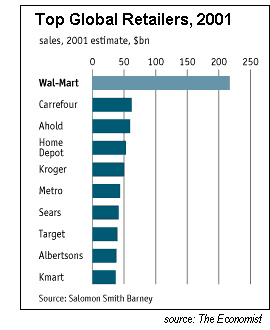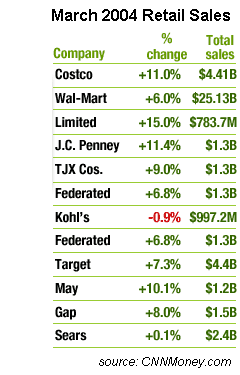

|
| weblog/wEssays archives | home | |
|
The Colossus, Globalization, and More: Wal-Mart (August 31, 2006) My recent entry on Wal-Mart (scroll down to August 29) drew two excellent commentaries, which are reprinted below. But before we get to those, let's cover the context surrounding any discussion of Wal-Mart. (Note: this is a long entry, but well worth reading through to the end.)  1. Size matters. Wal-Mart is by far the world's largest retailer. Though this
chart is a bit dated (2005 sales at Wal-Mart exceeded $285 billion, and 2006 sales are on
track to hit over $300 billion), the relative weight of Wal-Mart compared to its global
competitors hasn't changed. It is the proverbial 800-pound gorilla. Its policies can
literally move the world.
1. Size matters. Wal-Mart is by far the world's largest retailer. Though this
chart is a bit dated (2005 sales at Wal-Mart exceeded $285 billion, and 2006 sales are on
track to hit over $300 billion), the relative weight of Wal-Mart compared to its global
competitors hasn't changed. It is the proverbial 800-pound gorilla. Its policies can
literally move the world.
2. Wal-Mart very ably tells its side of many issues on this website, Wal-Martfacts.com which I recommend checking out. 3. For a variety of reasons, Wal-Mart excites emotional responses in many of us. I believe the reader-commentators I quote at length below make valid points and ask valid questions which are not emotionally biased; while I do not have answers for all the issues raised, I would like to clarify my own position. (Feel free to scroll down and read the corresponents comments first and then return to my own comments.) 4. I don't "hate" Wal-Mart but I do see evidence that they rely on taxpayer funding as part of their low-cost business plan--something which not all their competitors do. Hence, they are gaming the system to the disadvantage of taxpayers. That is my core objection. If one retailer gets to off-load healthcare coverage onto the government/taxpayers, then all retailers should be offered that same advantage via a "level playing field."  If one retailer pays a decent wage and provides its employees with some medical insurance
and 401K-type pension, while another pays lower wages and few benefits, because it knows
the government will provide those for its employees if it doesn't, then who wins in the
long run? The competitor (Wal-Mart) who is basically using the government to pay some of its
employee benefits (medical and retirement).
If one retailer pays a decent wage and provides its employees with some medical insurance
and 401K-type pension, while another pays lower wages and few benefits, because it knows
the government will provide those for its employees if it doesn't, then who wins in the
long run? The competitor (Wal-Mart) who is basically using the government to pay some of its
employee benefits (medical and retirement).
Wouldn't it be fairer to require a level playing field for all retailers? In Hawaii, for instance, a law requires employers to pay 50% of all employees' medical insurance, regardless of the firm's size. (I think the cut-off is 20 hours per week, which of course can be evaded by hiring people to work 18 hours a week). The idea is, all employees get some help in medical coverage, and all employers pay some of those expenses. Hence: a level playing field. 5. The alternative is what Japan and Europe offer employers and citizens: the government provides the medical coverage, freeing all employers equally from that burden. What strikes me as patently unfair and thus uncompetitive about Wal-Mart et. al. is that the government picks up the tab for thousands of their employees while other global corporations such as Ford, Boeing, Costco, Hewlett-Packard, etc. cover all or a significant portion of these costs. 6. As for China and other low-wage havens, let's look at what U.S. retailers can do, even in a global workforce situation. If U.S. corporations require overseas contract employees to be paid, say, $120 rather than $80 a month, and that their work hours be limited to 10 hours per day, etc., then some factory will switch over to meet those standards in order to serve the U.S. market--or Wal-Mart alone, since it is basically a small nation in and of itself. Their competitors will eventually find it hard to recruit the best workers, as they have migrated to the better wages and working conditions of the factory meeting U.S. standards. Since factory wages are such a small part of the final product's retail cost, U.S. retailers such as Wal-Mart can improve the global working conditions and wages for many workers without unduly jeopardizing their global competitive position. Companies such as Hewlett-Packard have made an effort to require minimal standards for the workplaces of their contract manufacturers (OEMs) in China (including inspections to oversee compliance); if H-P can do it, then why can't Wal-Mart? 7. The argument that requiring Wal-Mart to pay modest benefits and decent wages would significantly impact its low-income customers is false. A 20% increase in wages and benefits would not translate into a 20% rise in the retail cost of goods. Although I cannot locate any statistics to use as metrics, I suspect the entire year's impact of slightly higher prices would be equivalent to about the cost of one meal for the family at McDonalds and an armfull of DVD rentals. Yet the impact on the employee would be very significant. To summarize one argument offered in favor of the Wal-Mart model: their low prices outweigh the low wages if you consider the benefits to the entire community. But this is a false analysis. The question should be: how does Wal-Mart compare against a competitor such as Costco which pays decent wages and benefits while also offering low prices? Are Costco prices low enough to save consumers money? Yes. Do they pay employees more than Wal-Mart? Yes. Do they still make a profit? Yes. (While I know Costco pays well anecdotally, I was unable to find statistics to back this up-- if anyone has comparative stats on wages and benefits paid by Target, Costco and Wal-Mart, I would appreciate a link.) 8. This discussion also raises another theme with which readers of this blog are familar--the looming crises in American healthcare (or lack of it). According to The Wall Street Journal, the number of people without health insurance increased to 46.6 million in 2005. (About 45.3 million people were without insurance the year before. Hey, a million here and a million there, and pretty soon you're talking about a lot of people.) Then there's the millions of people like myself, self-employed or small business owners, who are hanging onto their insurance coverage by a thin thread. Many people (myself included) believe that the U.S. will get a national healthcare plan only when Corporate America finds their medical costs so heavy that there is simply no other way to stay in business but to off-load healthcare onto the Federal government. At that magical tipping point, all the objections and all the rah-rah about free enterprise will suddenly vanish, because profits (or in the case of the U.S. auto industry, their very survival) will be at stake. In summary: Global corporations can afford to pay their employees wages and benefits such that said employees don't need public assistance to live. If we as a nation want retailers to offer some form of work-welfare, then all retailers should share the same government benefits/support structure. OK, on to the readers' commentaries. Here is one who points out that small business games the system by paying wages under the table, avoiding both taxes and benefits costs: My first "real" job back in 1979 was inside a grocery store (I was the clean up boy in the butcher shop working for $2 an hour cash + free cokes and candy). When I graduated from High School in 1983 I had moved on from clean up boy to carry out boy to cashier and weekend manager of the little Burlingame store. The Italian Immigrants that owned the place never put me on payroll, paid any taxes or gave me any health care but they more than doubled my salary to $5 an hour cash + let me have a case of beer every now and then...Next up is correspondent Michael Goodfellow, who last contributed an incisive analysis of the looming Social Security crisis. He observes that the key drivers to many of these issues are larger than Wal-Mart: technology and education: Wal-Mart seems to have become a symbol of globalization (especially goods from China) and low-paying jobs in the U.S.. Wal-Mart stores have drawn a lot of local opposition from activists, despite their popularity with shoppers. States like Maryland are trying to force them to provide health insurance. I would really like critics to give honest answers to the following questions:Thank you, Michael and our other reader, for such cogent commentaries. Thanks to you, I have a better understanding of the issues raised by critiques of Wal-Mart. For more on this subject and a wide array of other topics, please visit my weblog. copyright © 2006 Charles Hugh Smith. All rights reserved in all media. I would be honored if you linked this wEssay to your site, or printed a copy for your own use. |
||
| weblog/wEssays | home |